More than Simply Showing New Staff Where the Bathroom Is…
January 6, 2022
League contract wins Preceptor Pay for more members.

Every employee expects a grace period when they first start a new job. No one expects that a new employee should be operating with the same speed and precision as someone who has worked in an institution for 30 years.
For police officers and fire fighters, it is widely accepted that the rookies will partner up with a more experienced hand to avoid making life-threatening mistakes in their first days and weeks on the job.
“What people often forget is that many healthcare jobs involve making split-second decisions that can have life-or-death consequences, too,” said Tina Brady, an 1199 Licensed Mental Health Counsellor at Zucker Hillside Hospital in Queens.
How can a recent recruit be brought up to speed in a healthcare setting? On-boarding videos produced by the HR team are fine, but the real work of showing them the ropes always ends up falling to the more experienced members on their team.
For many years, RNs have been doing this work to support new members coming into their unit and receiving a differential known as “Preceptor Pay.” In 2018, during the previous contract negotiations the Union settled with the League of Voluntary Hospitals and Homes, the Union negotiated an expansion of that differential to cover Surgical Techs.
This September when the latest League contract was settled, the union won a further expansion of Preceptor Pay for dozens of other professional and technical titles, who will now receive a $2/hour differential for training a new co-worker.

This makes on-the-job training more important than ever before.
Adnan Isa, who joined 1199SEIU fifteen years ago as a Physician Assistant at Beth Israel, says:
“Hospitals aren’t the safest places: There is so much going on, and when you have to change gears, a lot can fall through the cracks.”
No matter the role, as healthcare workers, there are many hidden dangers that only a person with experience in that role and in that location can navigate a new hire through.
Isa appreciates the newly-negotiated preceptor pay, adding: “It is draining to keep training people to know what to focus on. It gets to you after a while. We speak often with the nurses about it; they know what we go through.”
“Almost every day you catch something. For instance, there is an antibiotic called Vancomycin, and forgetting to check the lab reading for the patient could result in an incorrect dose which could cause acute kidney injury. When administering blood thinner, you also have to check the lab reports. If the blood is too thick, it can clot during a bypass surgery. If it is too thin, the patient can end up with an internal bleed.”
At Zucker Hillside, Brady belongs to a group of Professionals who won their first contract a couple of years ago. “We have been seeing an increase in our workload recently, and our caseloads were already unmanageable. There are very long waiting lists for our mental health services, as we are a good hospital.”
Precepting takes time if done properly and is also a heavy responsibility. “You could lose your license if somebody you are teaching makes a mistake,” says Brady.
She described an incident when she was flagged down on her way to the kitchen by a student she was overseeing, because a patient she had on the phone was threatening to kill himself. Brady supported the student with techniques for keeping the man on the phone so that a suicide could be averted.
“We really deserve this new preceptor pay,’’ says Brady, “It is infuriating that management trivializes the work we do in highrisk settings.”
And it is not just professional and technical workers whose training time merits a differential. “I have seen dietary workers, phlebotomists and receptionists being attacked on our floors,” adds Brady. “You have to know where the blind spots are. That is the part they do not teach you in the HR videos.”
1199 Magazine | November - December 2021

